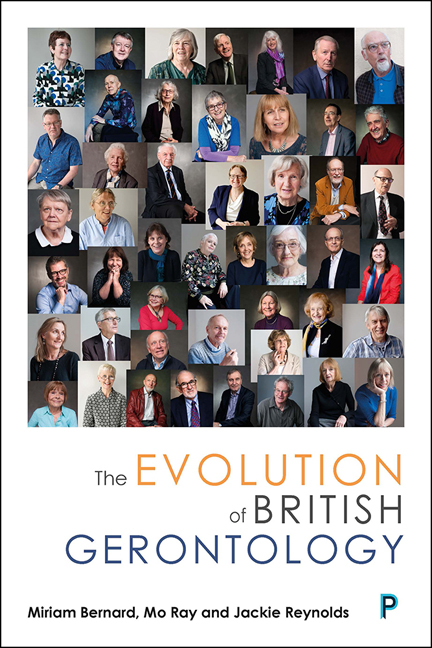Book contents
- Frontmatter
- Dedication
- Contents
- Acknowledgements
- PART I The Ageing of British Gerontology
- PART II Learning from the Past
- PART III Lives and Careers in Gerontology
- PART IV Informing the Future
- Appendix 1: Timeline: Policies, Research Programmes, Organisations and key Events
- Appendix 2: Conference themes, sub-themes and Selected Topics, 1971– 2018
- Bibliography
- Index
5 - Becoming and Being a Gerontologist
Published online by Cambridge University Press: 25 February 2021
- Frontmatter
- Dedication
- Contents
- Acknowledgements
- PART I The Ageing of British Gerontology
- PART II Learning from the Past
- PART III Lives and Careers in Gerontology
- PART IV Informing the Future
- Appendix 1: Timeline: Policies, Research Programmes, Organisations and key Events
- Appendix 2: Conference themes, sub-themes and Selected Topics, 1971– 2018
- Bibliography
- Index
Summary
Introduction
This chapter marks the start of our more detailed exploration of participants’ lives and careers in gerontology. Unlike the next two chapters that make up this part of the book, it does not begin with a consideration of other literature. Instead, it expands on the themes highlighted in Chapter 1 when we introduced participants – and on the pen portraits in Chapter 2 – and is designed to contextualise what follows. First, it explores some of the factors that led people to become gerontologists: their childhood and family experiences; how early professional/voluntary work has exerted an influence; important people and places; and the serendipitousness of many people's entry into ageing. Next, we examine what has shaped people's pathways into and through gerontology, encompassing both their ‘becoming’ and ‘being’ gerontologists. We identify four pathways: research – and then practitioner – routes into academia, knowledge exchange routes, and what we have termed ‘hybrid’ routes, whereby people's careers incorporate both academia and practice.
The wide range of perspectives and experiences evidenced in these analyses demonstrate that becoming and being a gerontologist is a far more complex and diverse undertaking than its traditional foundations in biology, psychology and sociology might suggest. Given the challenges this poses for how we think about gerontology and what gerontologists do, we go on to examine what can be learnt about the field through the motivations of those who have led it. Our participants were effectively pioneers, developing and sustaining their involvement in what was seen widely as an unpopular area of work and often as a poor choice in terms of career development. We also contend that whether or not people feel willing and able to define as gerontologists – and the reasons for this – is absolutely critical. Here, we explore the significance of people's disciplinary backgrounds, the extent to which they identify as gerontologists, and what they believe qualifies them to use the title.
Becoming a gerontologist: early influences
Childhood, family and early work experiences
As Chapter 1 indicated, in retrospect, early family and work or volunteering experiences were influential in some people becoming gerontologists.
- Type
- Chapter
- Information
- The Evolution of British GerontologyPersonal Perspectives and Historical Developments, pp. 145 - 166Publisher: Bristol University PressPrint publication year: 2020

